A Comparative Analysis of Existential and Person-Centered Therapy
VerifiedAdded on 2020/05/28
|9
|1937
|121
Essay
AI Summary
This essay provides a comparative analysis of existential and person-centered therapies, highlighting their similarities and differences across three key areas: key concepts and attributes, historical development, and the role of the therapist. The essay begins by defining existentialism as a philosophical approach that influences counseling practice, emphasizing individual autonomy and choice, while person-centered therapy, developed by Carl Rogers, focuses on the client's self-healing abilities within the therapeutic relationship. The historical development of each therapy is explored, with existentialism rooted in the works of Frankl and May, and person-centered therapy emerging from Rogers' focus on the client's innate capacity for self-actualization. The role of the therapist is then contrasted, with person-centered therapists facilitating a supportive environment and existential therapists helping clients explore their subjective world and take responsibility for their lives. The essay concludes by summarizing the distinct features of each approach and their implications for therapeutic practice.
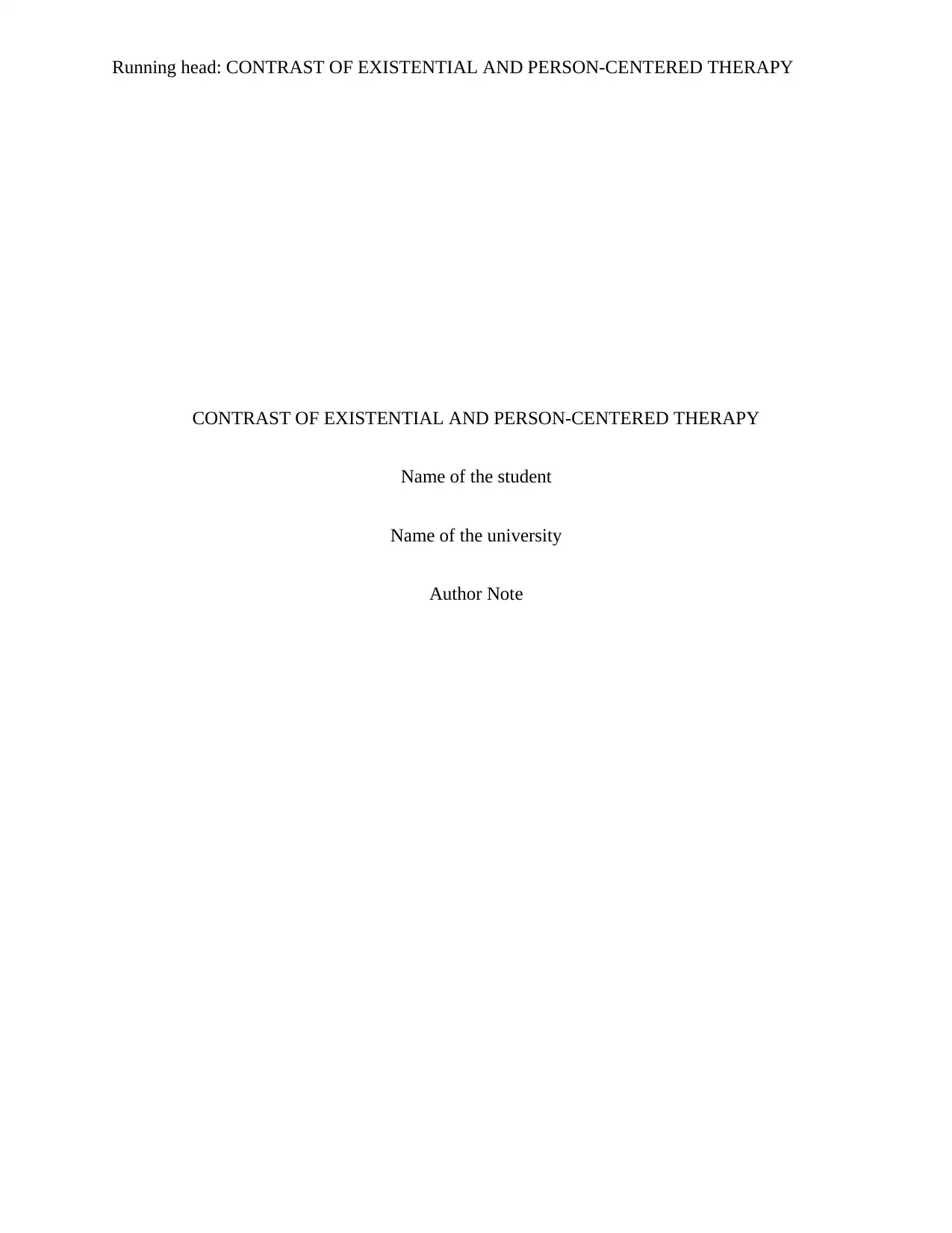
Running head: CONTRAST OF EXISTENTIAL AND PERSON-CENTERED THERAPY
CONTRAST OF EXISTENTIAL AND PERSON-CENTERED THERAPY
Name of the student
Name of the university
Author Note
CONTRAST OF EXISTENTIAL AND PERSON-CENTERED THERAPY
Name of the student
Name of the university
Author Note
Paraphrase This Document
Need a fresh take? Get an instant paraphrase of this document with our AI Paraphraser
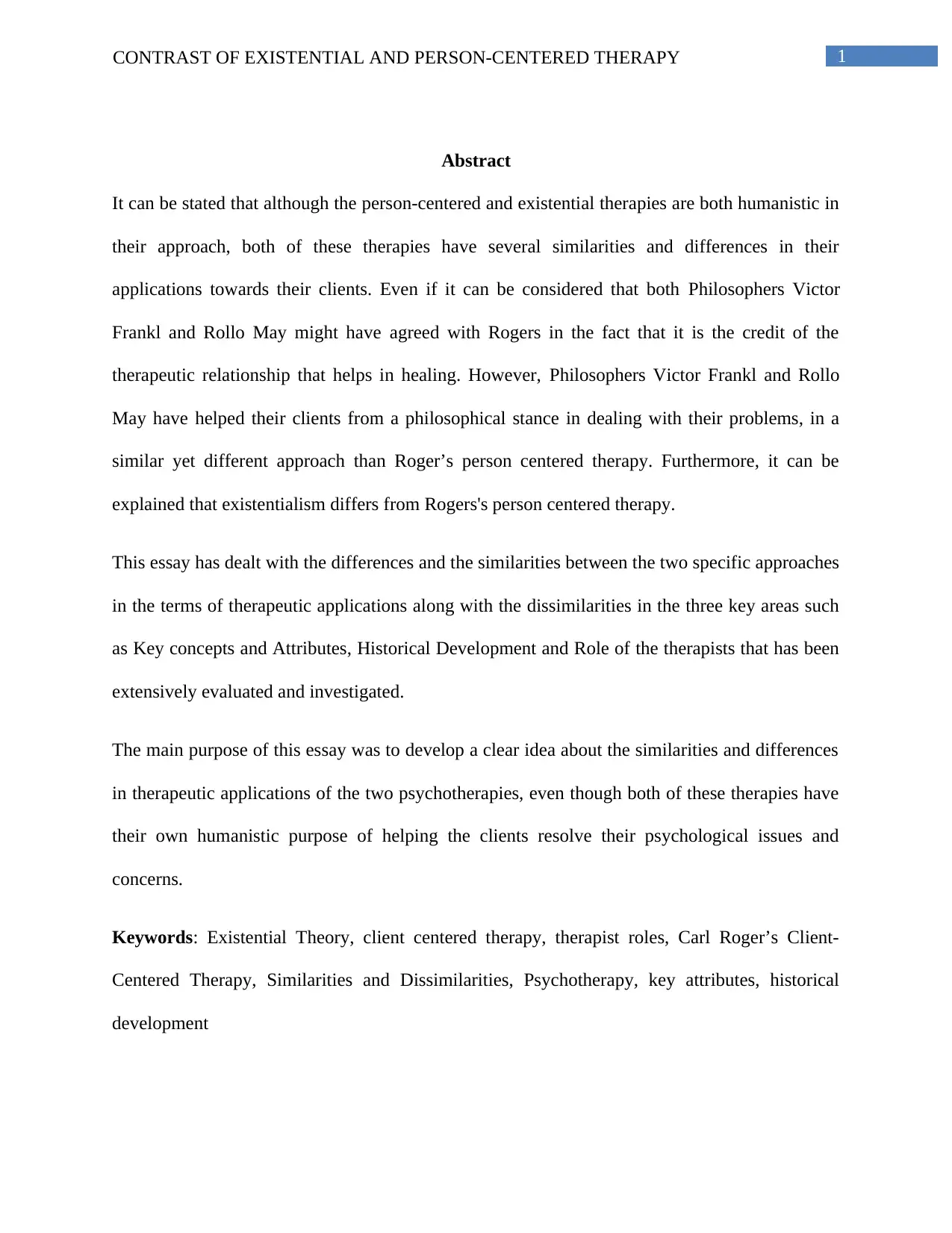
1CONTRAST OF EXISTENTIAL AND PERSON-CENTERED THERAPY
Abstract
It can be stated that although the person-centered and existential therapies are both humanistic in
their approach, both of these therapies have several similarities and differences in their
applications towards their clients. Even if it can be considered that both Philosophers Victor
Frankl and Rollo May might have agreed with Rogers in the fact that it is the credit of the
therapeutic relationship that helps in healing. However, Philosophers Victor Frankl and Rollo
May have helped their clients from a philosophical stance in dealing with their problems, in a
similar yet different approach than Roger’s person centered therapy. Furthermore, it can be
explained that existentialism differs from Rogers's person centered therapy.
This essay has dealt with the differences and the similarities between the two specific approaches
in the terms of therapeutic applications along with the dissimilarities in the three key areas such
as Key concepts and Attributes, Historical Development and Role of the therapists that has been
extensively evaluated and investigated.
The main purpose of this essay was to develop a clear idea about the similarities and differences
in therapeutic applications of the two psychotherapies, even though both of these therapies have
their own humanistic purpose of helping the clients resolve their psychological issues and
concerns.
Keywords: Existential Theory, client centered therapy, therapist roles, Carl Roger’s Client-
Centered Therapy, Similarities and Dissimilarities, Psychotherapy, key attributes, historical
development
Abstract
It can be stated that although the person-centered and existential therapies are both humanistic in
their approach, both of these therapies have several similarities and differences in their
applications towards their clients. Even if it can be considered that both Philosophers Victor
Frankl and Rollo May might have agreed with Rogers in the fact that it is the credit of the
therapeutic relationship that helps in healing. However, Philosophers Victor Frankl and Rollo
May have helped their clients from a philosophical stance in dealing with their problems, in a
similar yet different approach than Roger’s person centered therapy. Furthermore, it can be
explained that existentialism differs from Rogers's person centered therapy.
This essay has dealt with the differences and the similarities between the two specific approaches
in the terms of therapeutic applications along with the dissimilarities in the three key areas such
as Key concepts and Attributes, Historical Development and Role of the therapists that has been
extensively evaluated and investigated.
The main purpose of this essay was to develop a clear idea about the similarities and differences
in therapeutic applications of the two psychotherapies, even though both of these therapies have
their own humanistic purpose of helping the clients resolve their psychological issues and
concerns.
Keywords: Existential Theory, client centered therapy, therapist roles, Carl Roger’s Client-
Centered Therapy, Similarities and Dissimilarities, Psychotherapy, key attributes, historical
development
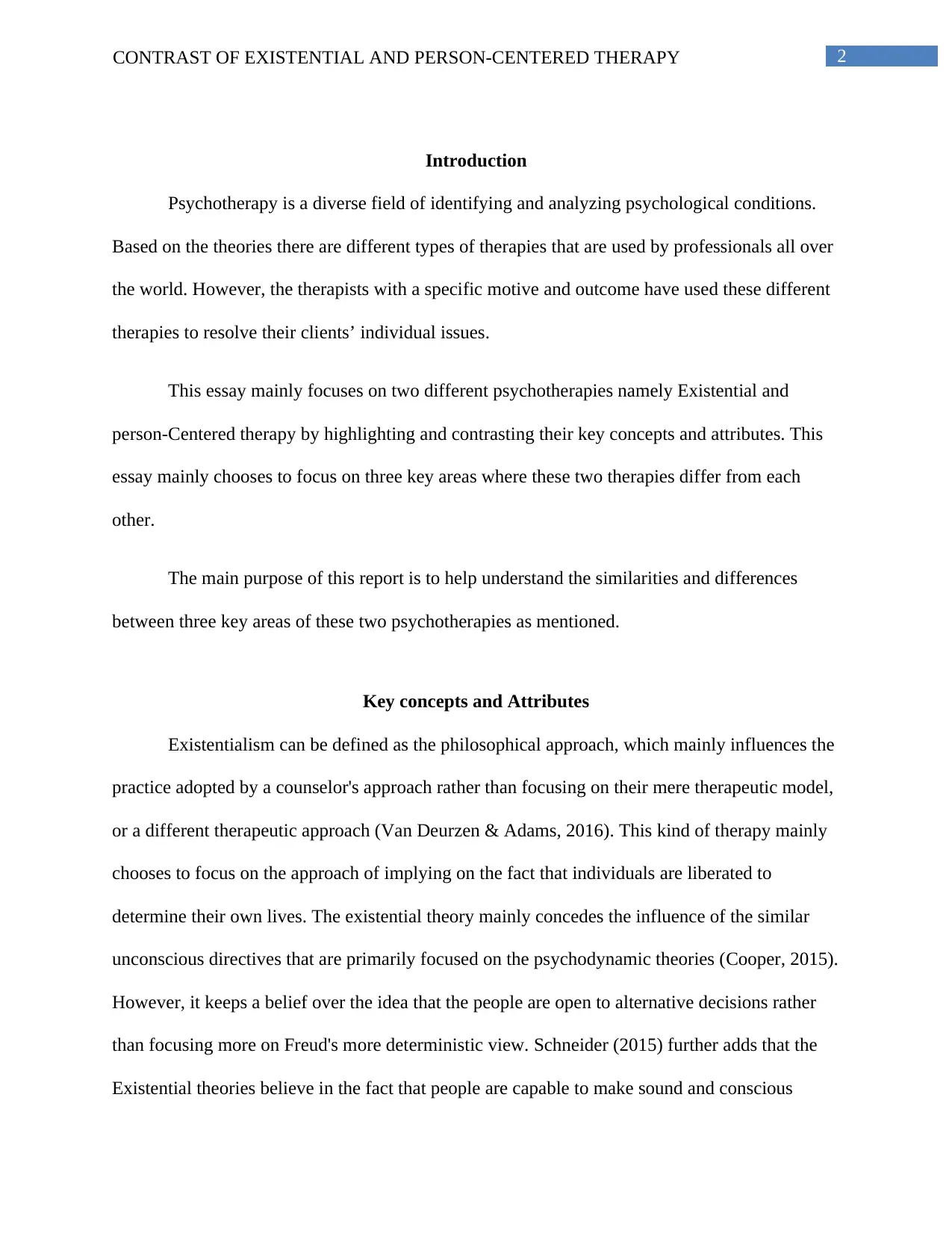
2CONTRAST OF EXISTENTIAL AND PERSON-CENTERED THERAPY
Introduction
Psychotherapy is a diverse field of identifying and analyzing psychological conditions.
Based on the theories there are different types of therapies that are used by professionals all over
the world. However, the therapists with a specific motive and outcome have used these different
therapies to resolve their clients’ individual issues.
This essay mainly focuses on two different psychotherapies namely Existential and
person-Centered therapy by highlighting and contrasting their key concepts and attributes. This
essay mainly chooses to focus on three key areas where these two therapies differ from each
other.
The main purpose of this report is to help understand the similarities and differences
between three key areas of these two psychotherapies as mentioned.
Key concepts and Attributes
Existentialism can be defined as the philosophical approach, which mainly influences the
practice adopted by a counselor's approach rather than focusing on their mere therapeutic model,
or a different therapeutic approach (Van Deurzen & Adams, 2016). This kind of therapy mainly
chooses to focus on the approach of implying on the fact that individuals are liberated to
determine their own lives. The existential theory mainly concedes the influence of the similar
unconscious directives that are primarily focused on the psychodynamic theories (Cooper, 2015).
However, it keeps a belief over the idea that the people are open to alternative decisions rather
than focusing more on Freud's more deterministic view. Schneider (2015) further adds that the
Existential theories believe in the fact that people are capable to make sound and conscious
Introduction
Psychotherapy is a diverse field of identifying and analyzing psychological conditions.
Based on the theories there are different types of therapies that are used by professionals all over
the world. However, the therapists with a specific motive and outcome have used these different
therapies to resolve their clients’ individual issues.
This essay mainly focuses on two different psychotherapies namely Existential and
person-Centered therapy by highlighting and contrasting their key concepts and attributes. This
essay mainly chooses to focus on three key areas where these two therapies differ from each
other.
The main purpose of this report is to help understand the similarities and differences
between three key areas of these two psychotherapies as mentioned.
Key concepts and Attributes
Existentialism can be defined as the philosophical approach, which mainly influences the
practice adopted by a counselor's approach rather than focusing on their mere therapeutic model,
or a different therapeutic approach (Van Deurzen & Adams, 2016). This kind of therapy mainly
chooses to focus on the approach of implying on the fact that individuals are liberated to
determine their own lives. The existential theory mainly concedes the influence of the similar
unconscious directives that are primarily focused on the psychodynamic theories (Cooper, 2015).
However, it keeps a belief over the idea that the people are open to alternative decisions rather
than focusing more on Freud's more deterministic view. Schneider (2015) further adds that the
Existential theories believe in the fact that people are capable to make sound and conscious
⊘ This is a preview!⊘
Do you want full access?
Subscribe today to unlock all pages.

Trusted by 1+ million students worldwide
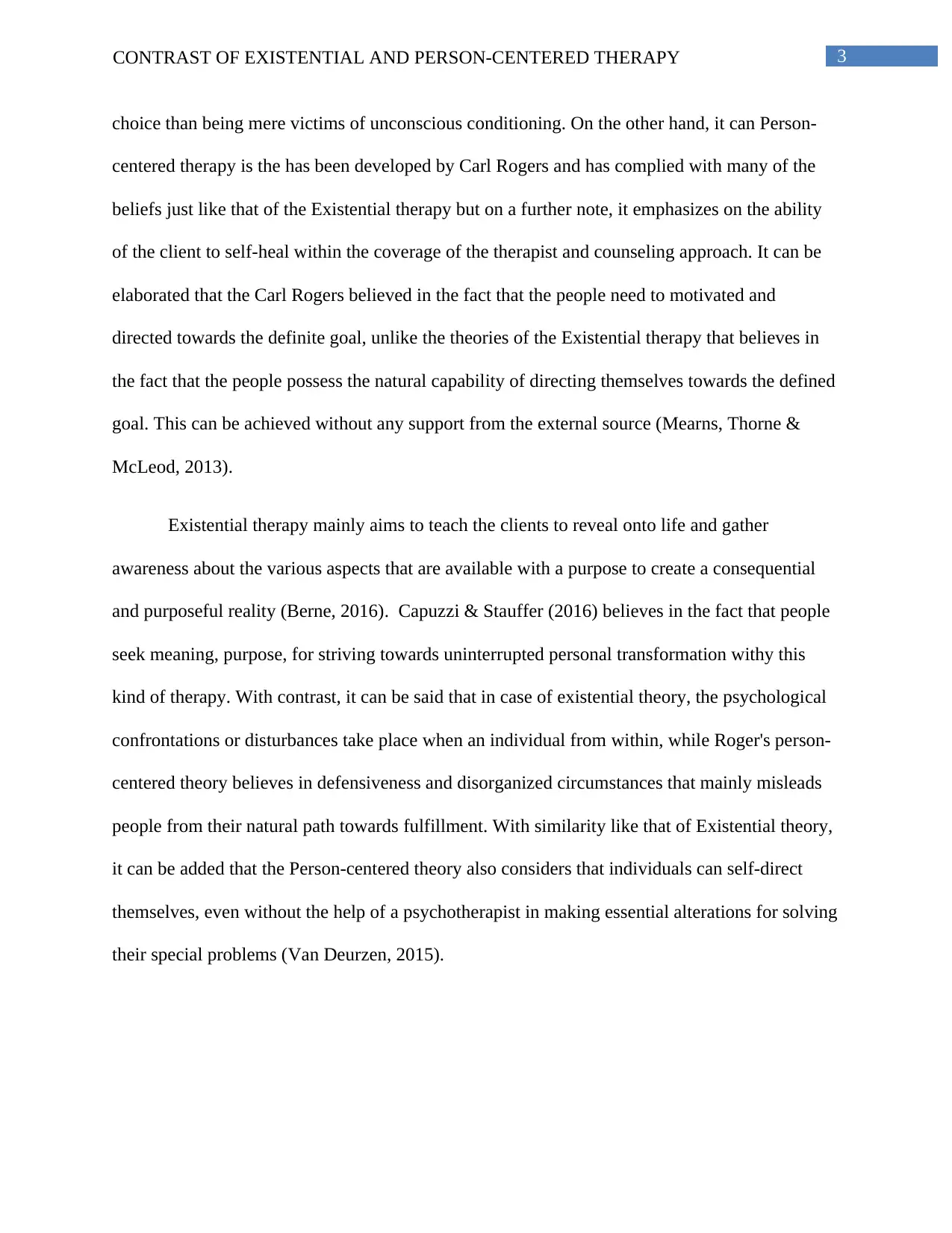
3CONTRAST OF EXISTENTIAL AND PERSON-CENTERED THERAPY
choice than being mere victims of unconscious conditioning. On the other hand, it can Person-
centered therapy is the has been developed by Carl Rogers and has complied with many of the
beliefs just like that of the Existential therapy but on a further note, it emphasizes on the ability
of the client to self-heal within the coverage of the therapist and counseling approach. It can be
elaborated that the Carl Rogers believed in the fact that the people need to motivated and
directed towards the definite goal, unlike the theories of the Existential therapy that believes in
the fact that the people possess the natural capability of directing themselves towards the defined
goal. This can be achieved without any support from the external source (Mearns, Thorne &
McLeod, 2013).
Existential therapy mainly aims to teach the clients to reveal onto life and gather
awareness about the various aspects that are available with a purpose to create a consequential
and purposeful reality (Berne, 2016). Capuzzi & Stauffer (2016) believes in the fact that people
seek meaning, purpose, for striving towards uninterrupted personal transformation withy this
kind of therapy. With contrast, it can be said that in case of existential theory, the psychological
confrontations or disturbances take place when an individual from within, while Roger's person-
centered theory believes in defensiveness and disorganized circumstances that mainly misleads
people from their natural path towards fulfillment. With similarity like that of Existential theory,
it can be added that the Person-centered theory also considers that individuals can self-direct
themselves, even without the help of a psychotherapist in making essential alterations for solving
their special problems (Van Deurzen, 2015).
choice than being mere victims of unconscious conditioning. On the other hand, it can Person-
centered therapy is the has been developed by Carl Rogers and has complied with many of the
beliefs just like that of the Existential therapy but on a further note, it emphasizes on the ability
of the client to self-heal within the coverage of the therapist and counseling approach. It can be
elaborated that the Carl Rogers believed in the fact that the people need to motivated and
directed towards the definite goal, unlike the theories of the Existential therapy that believes in
the fact that the people possess the natural capability of directing themselves towards the defined
goal. This can be achieved without any support from the external source (Mearns, Thorne &
McLeod, 2013).
Existential therapy mainly aims to teach the clients to reveal onto life and gather
awareness about the various aspects that are available with a purpose to create a consequential
and purposeful reality (Berne, 2016). Capuzzi & Stauffer (2016) believes in the fact that people
seek meaning, purpose, for striving towards uninterrupted personal transformation withy this
kind of therapy. With contrast, it can be said that in case of existential theory, the psychological
confrontations or disturbances take place when an individual from within, while Roger's person-
centered theory believes in defensiveness and disorganized circumstances that mainly misleads
people from their natural path towards fulfillment. With similarity like that of Existential theory,
it can be added that the Person-centered theory also considers that individuals can self-direct
themselves, even without the help of a psychotherapist in making essential alterations for solving
their special problems (Van Deurzen, 2015).
Paraphrase This Document
Need a fresh take? Get an instant paraphrase of this document with our AI Paraphraser
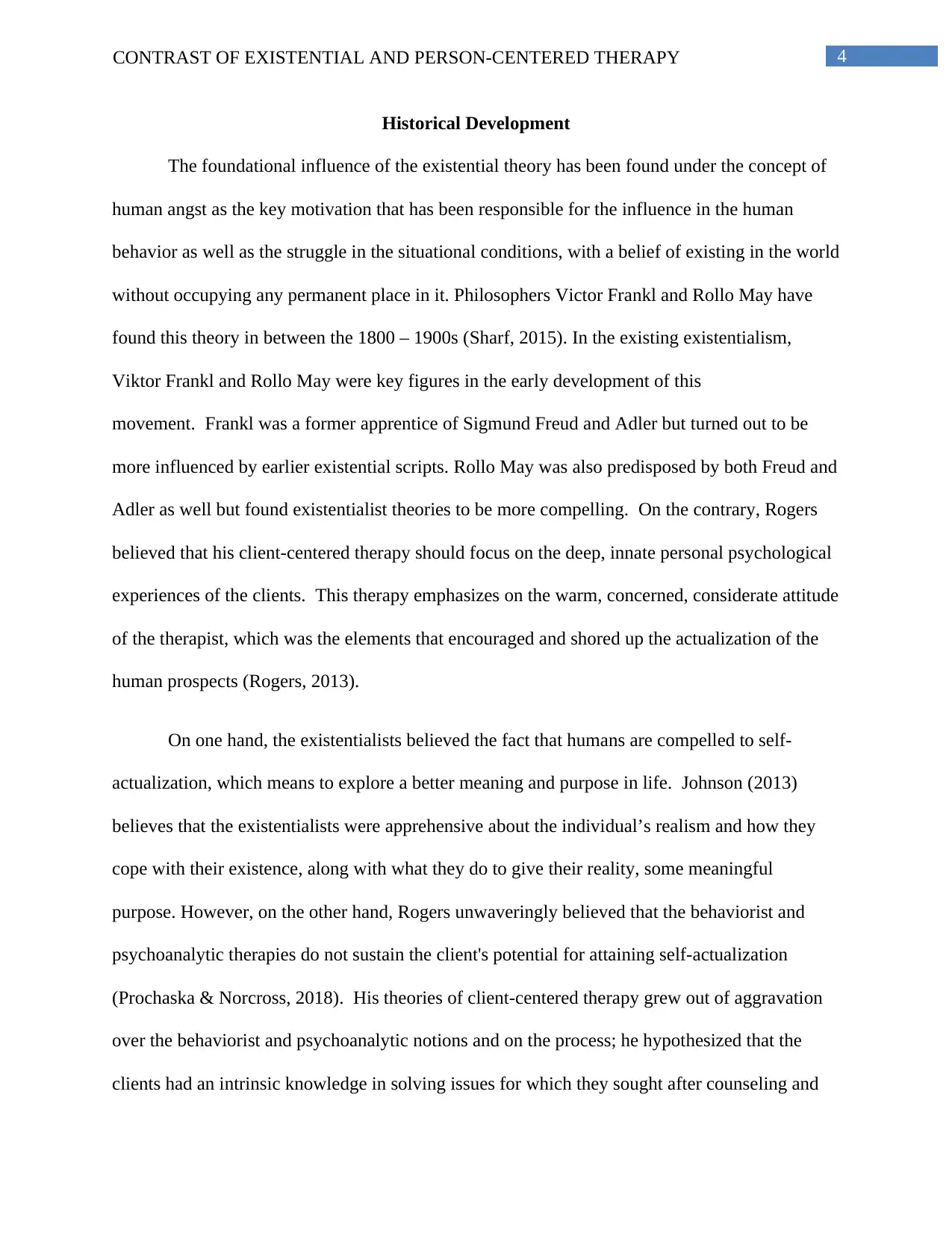
4CONTRAST OF EXISTENTIAL AND PERSON-CENTERED THERAPY
Historical Development
The foundational influence of the existential theory has been found under the concept of
human angst as the key motivation that has been responsible for the influence in the human
behavior as well as the struggle in the situational conditions, with a belief of existing in the world
without occupying any permanent place in it. Philosophers Victor Frankl and Rollo May have
found this theory in between the 1800 – 1900s (Sharf, 2015). In the existing existentialism,
Viktor Frankl and Rollo May were key figures in the early development of this
movement. Frankl was a former apprentice of Sigmund Freud and Adler but turned out to be
more influenced by earlier existential scripts. Rollo May was also predisposed by both Freud and
Adler as well but found existentialist theories to be more compelling. On the contrary, Rogers
believed that his client-centered therapy should focus on the deep, innate personal psychological
experiences of the clients. This therapy emphasizes on the warm, concerned, considerate attitude
of the therapist, which was the elements that encouraged and shored up the actualization of the
human prospects (Rogers, 2013).
On one hand, the existentialists believed the fact that humans are compelled to self-
actualization, which means to explore a better meaning and purpose in life. Johnson (2013)
believes that the existentialists were apprehensive about the individual’s realism and how they
cope with their existence, along with what they do to give their reality, some meaningful
purpose. However, on the other hand, Rogers unwaveringly believed that the behaviorist and
psychoanalytic therapies do not sustain the client's potential for attaining self-actualization
(Prochaska & Norcross, 2018). His theories of client-centered therapy grew out of aggravation
over the behaviorist and psychoanalytic notions and on the process; he hypothesized that the
clients had an intrinsic knowledge in solving issues for which they sought after counseling and
Historical Development
The foundational influence of the existential theory has been found under the concept of
human angst as the key motivation that has been responsible for the influence in the human
behavior as well as the struggle in the situational conditions, with a belief of existing in the world
without occupying any permanent place in it. Philosophers Victor Frankl and Rollo May have
found this theory in between the 1800 – 1900s (Sharf, 2015). In the existing existentialism,
Viktor Frankl and Rollo May were key figures in the early development of this
movement. Frankl was a former apprentice of Sigmund Freud and Adler but turned out to be
more influenced by earlier existential scripts. Rollo May was also predisposed by both Freud and
Adler as well but found existentialist theories to be more compelling. On the contrary, Rogers
believed that his client-centered therapy should focus on the deep, innate personal psychological
experiences of the clients. This therapy emphasizes on the warm, concerned, considerate attitude
of the therapist, which was the elements that encouraged and shored up the actualization of the
human prospects (Rogers, 2013).
On one hand, the existentialists believed the fact that humans are compelled to self-
actualization, which means to explore a better meaning and purpose in life. Johnson (2013)
believes that the existentialists were apprehensive about the individual’s realism and how they
cope with their existence, along with what they do to give their reality, some meaningful
purpose. However, on the other hand, Rogers unwaveringly believed that the behaviorist and
psychoanalytic therapies do not sustain the client's potential for attaining self-actualization
(Prochaska & Norcross, 2018). His theories of client-centered therapy grew out of aggravation
over the behaviorist and psychoanalytic notions and on the process; he hypothesized that the
clients had an intrinsic knowledge in solving issues for which they sought after counseling and
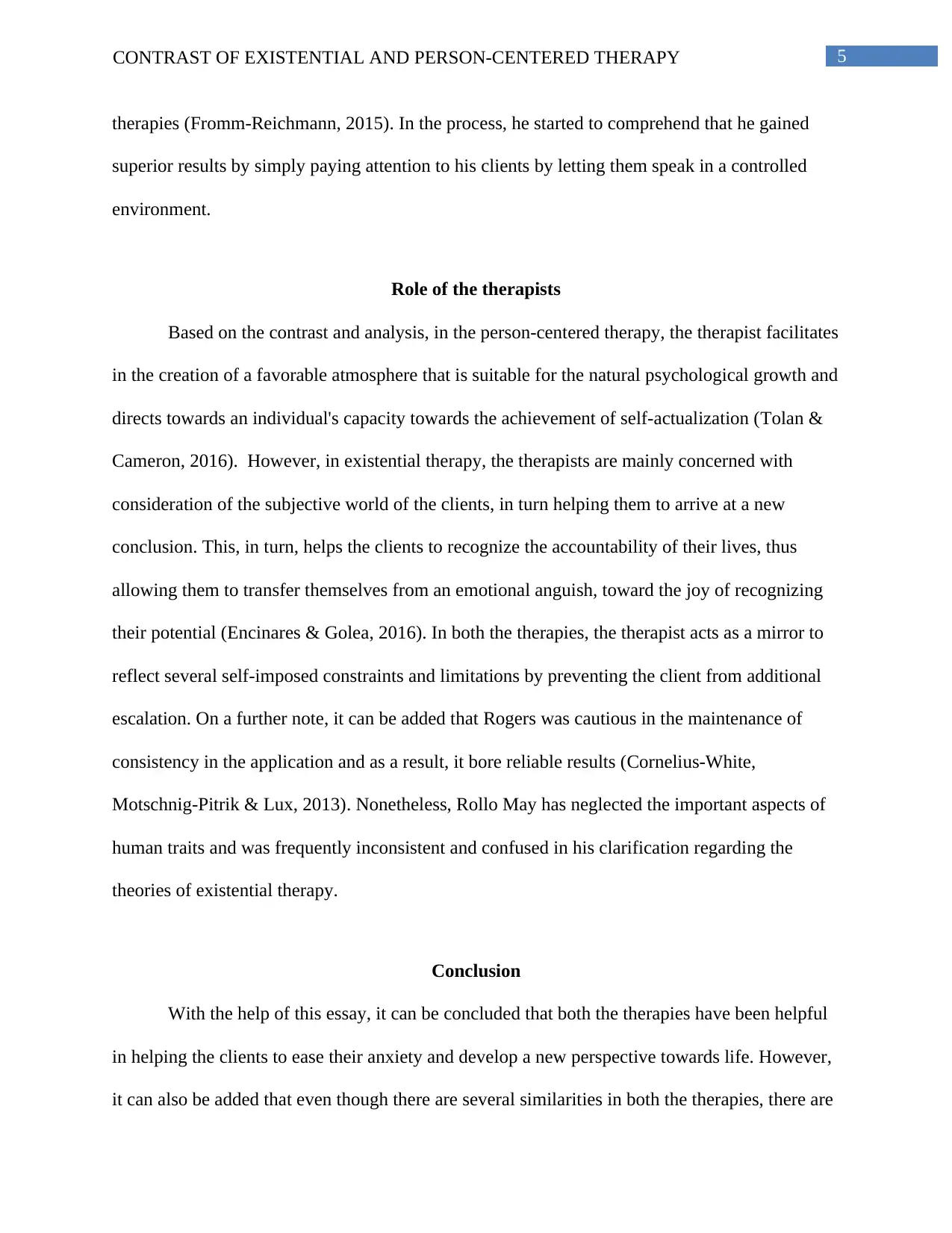
5CONTRAST OF EXISTENTIAL AND PERSON-CENTERED THERAPY
therapies (Fromm-Reichmann, 2015). In the process, he started to comprehend that he gained
superior results by simply paying attention to his clients by letting them speak in a controlled
environment.
Role of the therapists
Based on the contrast and analysis, in the person-centered therapy, the therapist facilitates
in the creation of a favorable atmosphere that is suitable for the natural psychological growth and
directs towards an individual's capacity towards the achievement of self-actualization (Tolan &
Cameron, 2016). However, in existential therapy, the therapists are mainly concerned with
consideration of the subjective world of the clients, in turn helping them to arrive at a new
conclusion. This, in turn, helps the clients to recognize the accountability of their lives, thus
allowing them to transfer themselves from an emotional anguish, toward the joy of recognizing
their potential (Encinares & Golea, 2016). In both the therapies, the therapist acts as a mirror to
reflect several self-imposed constraints and limitations by preventing the client from additional
escalation. On a further note, it can be added that Rogers was cautious in the maintenance of
consistency in the application and as a result, it bore reliable results (Cornelius-White,
Motschnig-Pitrik & Lux, 2013). Nonetheless, Rollo May has neglected the important aspects of
human traits and was frequently inconsistent and confused in his clarification regarding the
theories of existential therapy.
Conclusion
With the help of this essay, it can be concluded that both the therapies have been helpful
in helping the clients to ease their anxiety and develop a new perspective towards life. However,
it can also be added that even though there are several similarities in both the therapies, there are
therapies (Fromm-Reichmann, 2015). In the process, he started to comprehend that he gained
superior results by simply paying attention to his clients by letting them speak in a controlled
environment.
Role of the therapists
Based on the contrast and analysis, in the person-centered therapy, the therapist facilitates
in the creation of a favorable atmosphere that is suitable for the natural psychological growth and
directs towards an individual's capacity towards the achievement of self-actualization (Tolan &
Cameron, 2016). However, in existential therapy, the therapists are mainly concerned with
consideration of the subjective world of the clients, in turn helping them to arrive at a new
conclusion. This, in turn, helps the clients to recognize the accountability of their lives, thus
allowing them to transfer themselves from an emotional anguish, toward the joy of recognizing
their potential (Encinares & Golea, 2016). In both the therapies, the therapist acts as a mirror to
reflect several self-imposed constraints and limitations by preventing the client from additional
escalation. On a further note, it can be added that Rogers was cautious in the maintenance of
consistency in the application and as a result, it bore reliable results (Cornelius-White,
Motschnig-Pitrik & Lux, 2013). Nonetheless, Rollo May has neglected the important aspects of
human traits and was frequently inconsistent and confused in his clarification regarding the
theories of existential therapy.
Conclusion
With the help of this essay, it can be concluded that both the therapies have been helpful
in helping the clients to ease their anxiety and develop a new perspective towards life. However,
it can also be added that even though there are several similarities in both the therapies, there are
⊘ This is a preview!⊘
Do you want full access?
Subscribe today to unlock all pages.

Trusted by 1+ million students worldwide
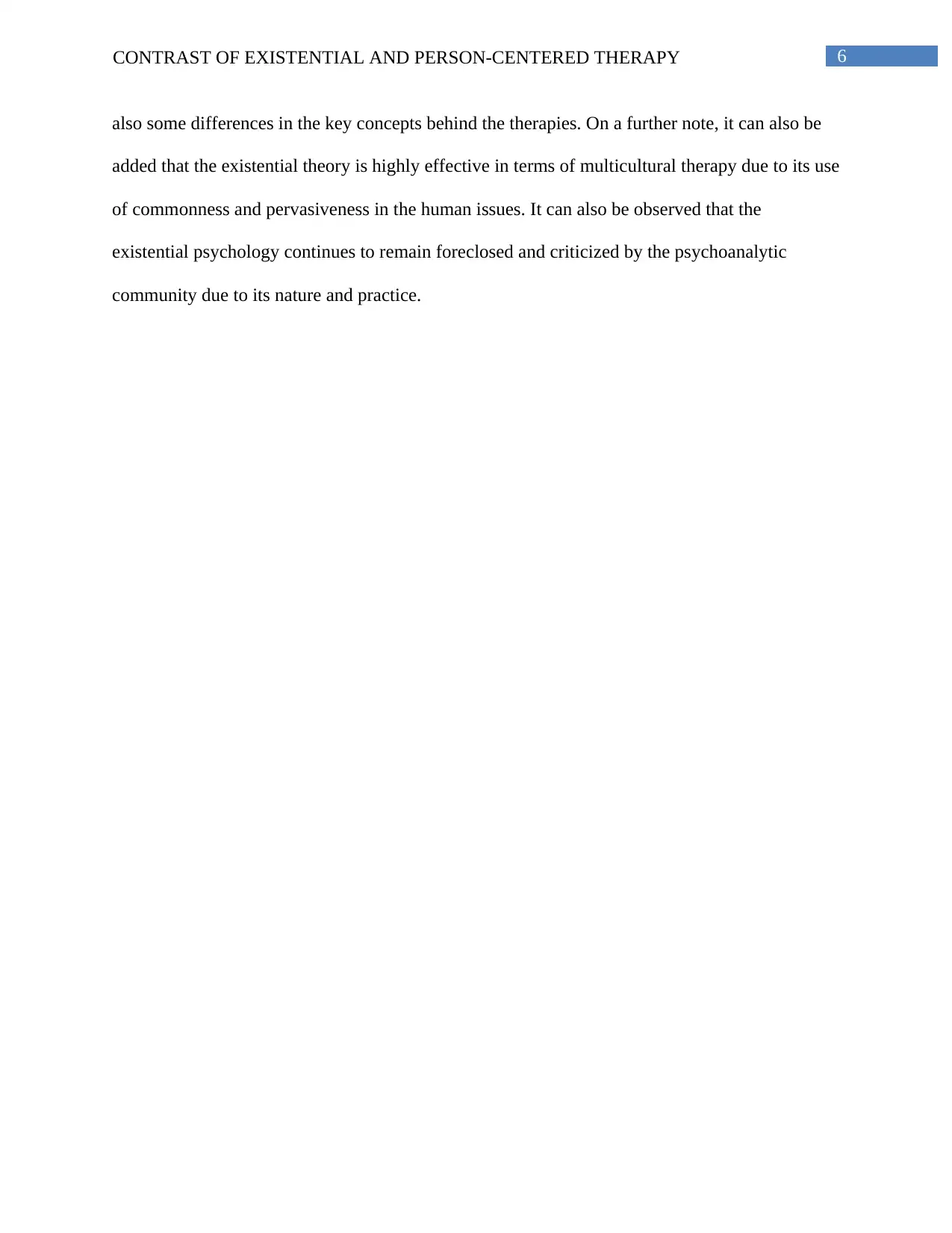
6CONTRAST OF EXISTENTIAL AND PERSON-CENTERED THERAPY
also some differences in the key concepts behind the therapies. On a further note, it can also be
added that the existential theory is highly effective in terms of multicultural therapy due to its use
of commonness and pervasiveness in the human issues. It can also be observed that the
existential psychology continues to remain foreclosed and criticized by the psychoanalytic
community due to its nature and practice.
also some differences in the key concepts behind the therapies. On a further note, it can also be
added that the existential theory is highly effective in terms of multicultural therapy due to its use
of commonness and pervasiveness in the human issues. It can also be observed that the
existential psychology continues to remain foreclosed and criticized by the psychoanalytic
community due to its nature and practice.
Paraphrase This Document
Need a fresh take? Get an instant paraphrase of this document with our AI Paraphraser
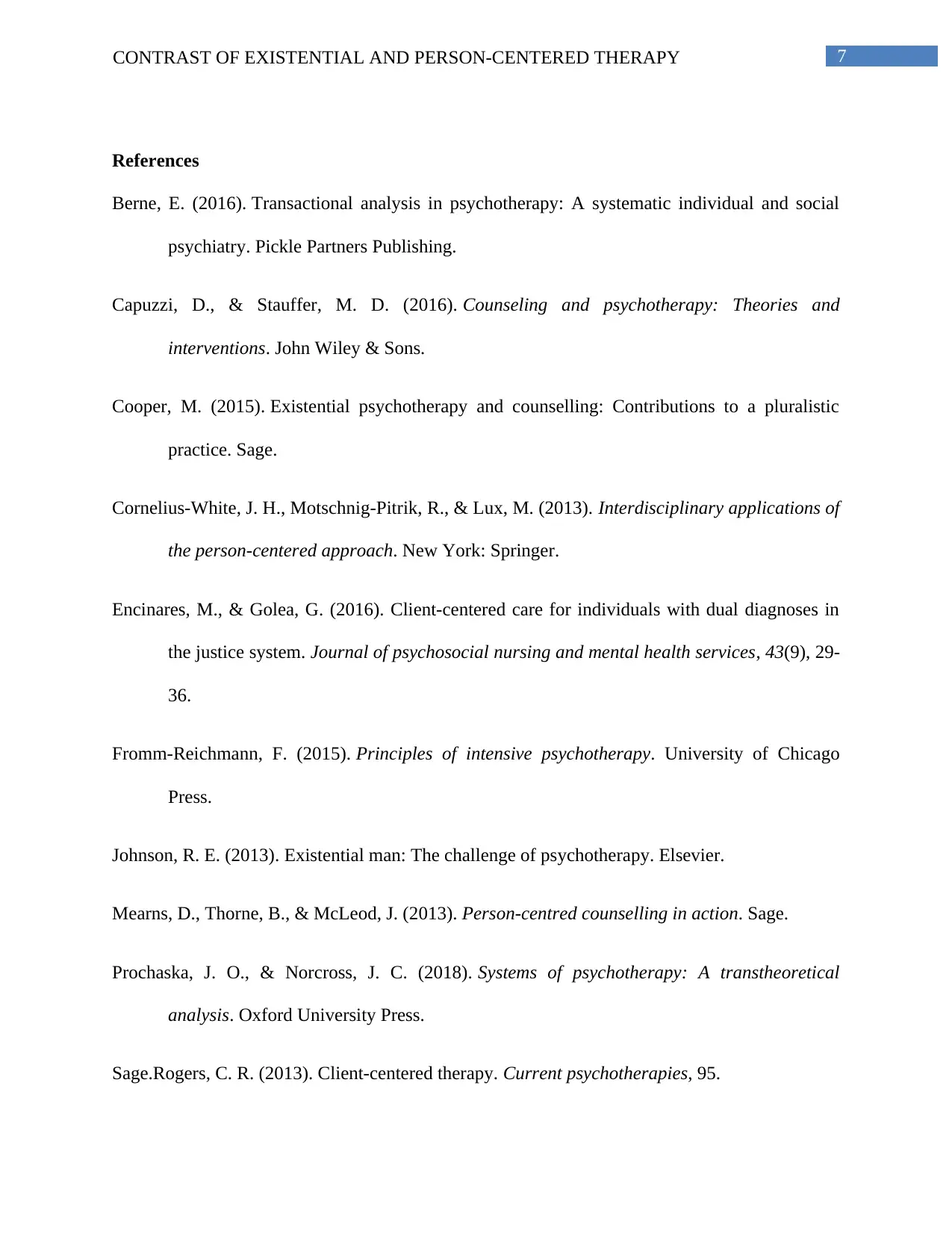
7CONTRAST OF EXISTENTIAL AND PERSON-CENTERED THERAPY
References
Berne, E. (2016). Transactional analysis in psychotherapy: A systematic individual and social
psychiatry. Pickle Partners Publishing.
Capuzzi, D., & Stauffer, M. D. (2016). Counseling and psychotherapy: Theories and
interventions. John Wiley & Sons.
Cooper, M. (2015). Existential psychotherapy and counselling: Contributions to a pluralistic
practice. Sage.
Cornelius-White, J. H., Motschnig-Pitrik, R., & Lux, M. (2013). Interdisciplinary applications of
the person-centered approach. New York: Springer.
Encinares, M., & Golea, G. (2016). Client-centered care for individuals with dual diagnoses in
the justice system. Journal of psychosocial nursing and mental health services, 43(9), 29-
36.
Fromm-Reichmann, F. (2015). Principles of intensive psychotherapy. University of Chicago
Press.
Johnson, R. E. (2013). Existential man: The challenge of psychotherapy. Elsevier.
Mearns, D., Thorne, B., & McLeod, J. (2013). Person-centred counselling in action. Sage.
Prochaska, J. O., & Norcross, J. C. (2018). Systems of psychotherapy: A transtheoretical
analysis. Oxford University Press.
Sage.Rogers, C. R. (2013). Client-centered therapy. Current psychotherapies, 95.
References
Berne, E. (2016). Transactional analysis in psychotherapy: A systematic individual and social
psychiatry. Pickle Partners Publishing.
Capuzzi, D., & Stauffer, M. D. (2016). Counseling and psychotherapy: Theories and
interventions. John Wiley & Sons.
Cooper, M. (2015). Existential psychotherapy and counselling: Contributions to a pluralistic
practice. Sage.
Cornelius-White, J. H., Motschnig-Pitrik, R., & Lux, M. (2013). Interdisciplinary applications of
the person-centered approach. New York: Springer.
Encinares, M., & Golea, G. (2016). Client-centered care for individuals with dual diagnoses in
the justice system. Journal of psychosocial nursing and mental health services, 43(9), 29-
36.
Fromm-Reichmann, F. (2015). Principles of intensive psychotherapy. University of Chicago
Press.
Johnson, R. E. (2013). Existential man: The challenge of psychotherapy. Elsevier.
Mearns, D., Thorne, B., & McLeod, J. (2013). Person-centred counselling in action. Sage.
Prochaska, J. O., & Norcross, J. C. (2018). Systems of psychotherapy: A transtheoretical
analysis. Oxford University Press.
Sage.Rogers, C. R. (2013). Client-centered therapy. Current psychotherapies, 95.
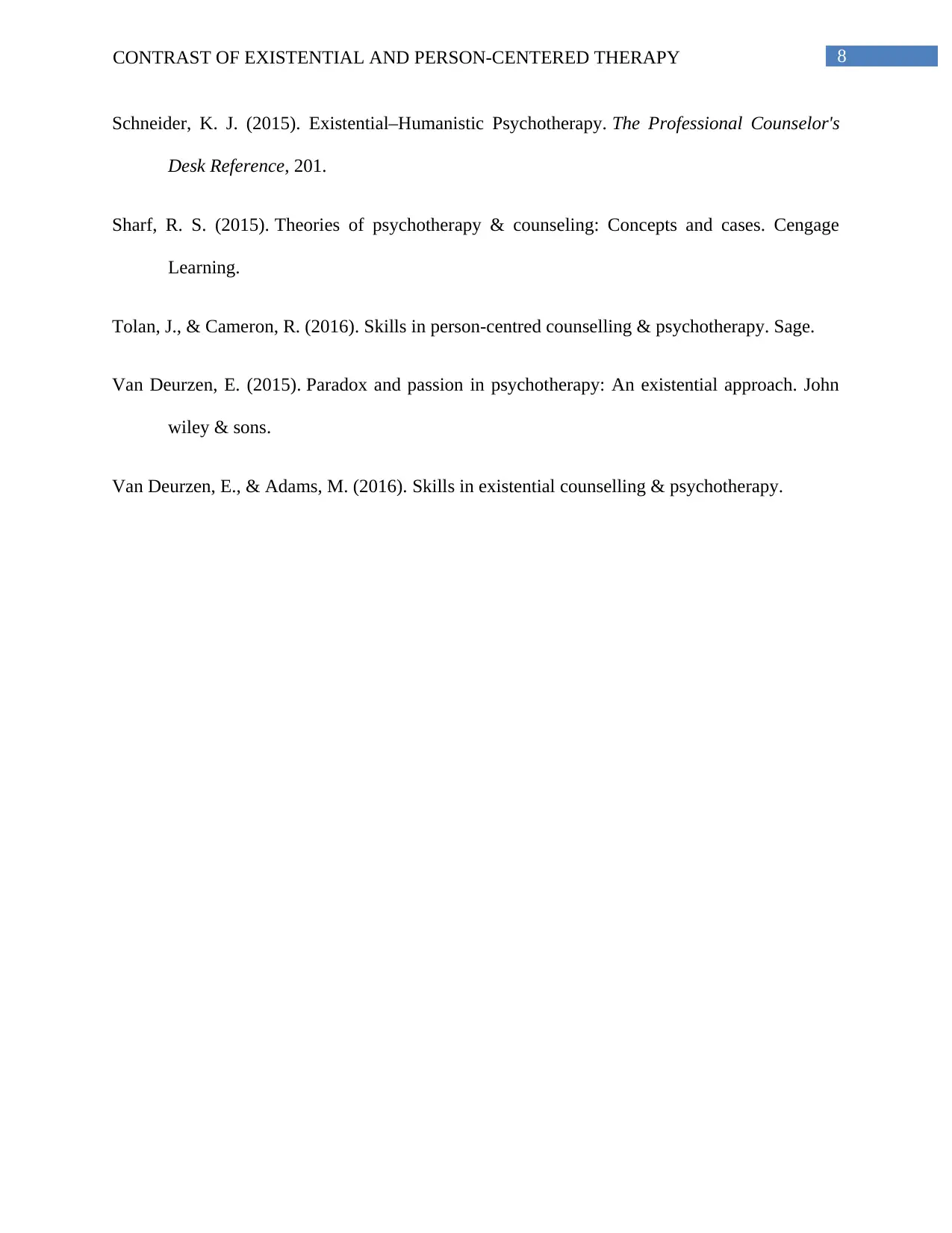
8CONTRAST OF EXISTENTIAL AND PERSON-CENTERED THERAPY
Schneider, K. J. (2015). Existential–Humanistic Psychotherapy. The Professional Counselor's
Desk Reference, 201.
Sharf, R. S. (2015). Theories of psychotherapy & counseling: Concepts and cases. Cengage
Learning.
Tolan, J., & Cameron, R. (2016). Skills in person-centred counselling & psychotherapy. Sage.
Van Deurzen, E. (2015). Paradox and passion in psychotherapy: An existential approach. John
wiley & sons.
Van Deurzen, E., & Adams, M. (2016). Skills in existential counselling & psychotherapy.
Schneider, K. J. (2015). Existential–Humanistic Psychotherapy. The Professional Counselor's
Desk Reference, 201.
Sharf, R. S. (2015). Theories of psychotherapy & counseling: Concepts and cases. Cengage
Learning.
Tolan, J., & Cameron, R. (2016). Skills in person-centred counselling & psychotherapy. Sage.
Van Deurzen, E. (2015). Paradox and passion in psychotherapy: An existential approach. John
wiley & sons.
Van Deurzen, E., & Adams, M. (2016). Skills in existential counselling & psychotherapy.
⊘ This is a preview!⊘
Do you want full access?
Subscribe today to unlock all pages.

Trusted by 1+ million students worldwide
1 out of 9
Related Documents
Your All-in-One AI-Powered Toolkit for Academic Success.
+13062052269
info@desklib.com
Available 24*7 on WhatsApp / Email
![[object Object]](/_next/static/media/star-bottom.7253800d.svg)
Unlock your academic potential
Copyright © 2020–2025 A2Z Services. All Rights Reserved. Developed and managed by ZUCOL.




